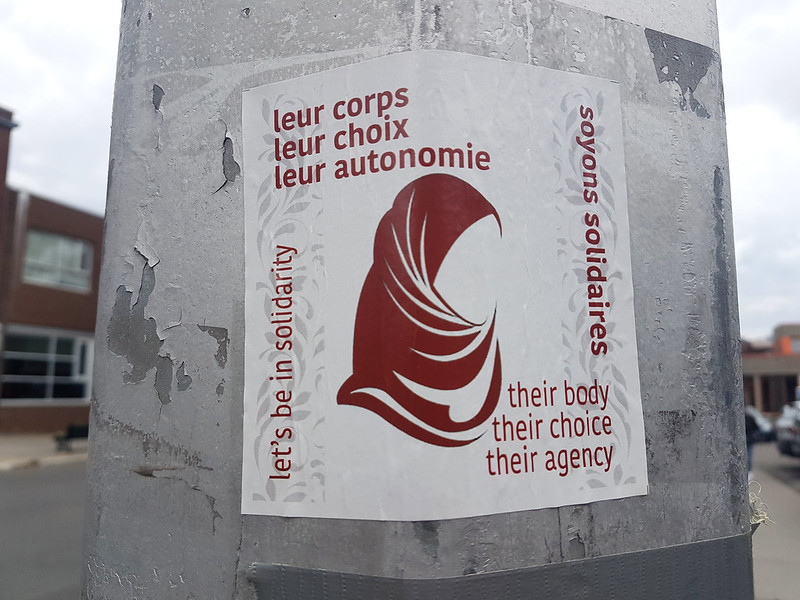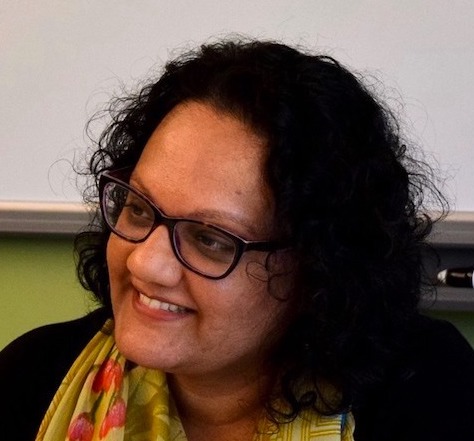
On June 6, 2021, in London, Ontario, the Afzaal family was run down and killed by a White man, leaving an injured young boy as the sole survivor. This is the most recent and high profile Islamophobic killing in Canada, following the January 2017 mosque shooting in Quebec. In both cases, the victims were targeted because they were Muslims.
In a similar manner to the reactions after the Quebec mosque shooting in 2017, many politicians and ordinary citizens have claimed that the attack in Ontario is exceptional. They claim that such things do not normally happen in Canada. To treat it as an exceptionally tragic event makes it possible to condemn the violence and to offer sympathy and support to Muslim communities without having to address the conditions which make the Islamophobia that motivates such attacks possible. The connection between individual actions and the systemic context is erased from view when violence against Muslims is treated as an isolated incident rather than as part of a longstanding political context.
Bill 21 is a flashpoint in this context. Bill 21, which became law in 2019 in Quebec, prohibits people who wear religious symbols from giving and receiving public services in the name of upholding Quebec’s commitment to secularism. In practice, the law disproportionately excludes Muslim women who wear hijabs from working in the public sector, as well as other religious minorities who wear visible religious symbols. A few days after the London attack, Prime Minister Trudeau was asked during a press conference about his views on this provincial law in light of his stated commitment to fighting Islamophobia. Trudeau responded that he had already expressed his disagreement with the law before, but that it was up to Quebecers to take it up as an issue.
The connection between individual actions and the systemic context is erased from view when violence against Muslims is treated as an isolated incident rather than as part of a longstanding political context.
Quebec’s Premier Legault, along with other Quebec politicians and party leaders, were quick to reject the idea that there was any relationship between Bill 21, Islamophobia, and the London attacks. As Bloc Quebecois leader, Yves-François Blanchet, stated, “…there is no relationship, no link between Bill 21 and that kind of gestures of hatred because Bill 21 has no meaning in London, Ontario.” Blanchet’s statement, along with those of the other Quebec party leaders, can be read, superficially, as commenting on the fact that a law that is passed in one province has no applicability in another. Technically, that is correct. More significantly, however, it reflects a refusal to see the discursive meaning that Muslims give to these two events.
I want to consider this alleged lack of connection and meaning in more depth, as I contend that it is indicative of a refusal both to know and to see Islamophobia. What does this refusal show us about the underlying relationship between Islamophobia and Whiteness, between Muslims and the nation in Quebec and in Canada? I suggest that there is an underlying relationship between the epistemological (what Edward Said describes as the production of knowledge about Islam and Muslims through reference to the west) and the political that can help illuminate the logic behind this refusal. How Muslims are known is connected to their political subjectivity. The refusal to know and to see Islamophobia, I claim, is ultimately a refusal to accept the political claim by Muslims to be treated as equal citizens. It is a refusal to see how Islamophobia is sustained through its connection to Whiteness in Quebec.
A Secular Nation
As Saba Mahmood has shown, hijabs and niqabs mark a fault line between the secularity of the western democratic nation on one hand, and the religiosity of Muslims on the other. Muslim women who wear them are defined entirely by their religious identity, and perceived as lacking individual agency. This defining makes it possible for the state to intervene via the law to “save Muslim women” in the name of western democracy that is based on secularism and gender equality. For the past decade in Quebec, various provincial governments have made efforts to legislate a ban on hijabs and niqabs. The current Coalition Avenir Quebec (CAQ) government has been the most successful thus far.
The refusal to know and to see Islamophobia, I claim, is ultimately a refusal to accept the political claim by Muslims to be treated as equal citizens. It is a refusal to see how Islamophobia is sustained through its connection to Whiteness in Quebec.
Legault’s government defends Bill 21 by claiming that it reflects Quebec’s “values,” namely, the importance of secularism. Secularism is closely tied to Quebec’s national imaginary following the Quiet Revolution of the 1960s and 1970s. During this period, religion and the Catholic Church were removed from the operations of the state and public sphere. At the same time, a Quebecois national identity based on French as its official language, gender equality, and secularism were cast as the defining characteristics of “modern” Quebec society.
Most Muslims in Quebec are francophones and have been settled in the province for several decades, since the Quiet Revolution. However, despite the fact that many Muslims are linguistically well-integrated in a society that centers French as both a language and national identity, their presence as racialized and religious minorities has come to be politicized in recent years within debates about “reasonable accommodation” and Quebec nationalism. The perceived hypervisibility of Muslim women who wear hijabs and niqabs in public spaces has been central to these debates, because it challenges the self-professed ideals of secularism and gender equality as part of a “modern” and nationalist view of Quebec.
The consolidation of secularism in Quebec is dependent in part upon the erasure of Muslim religiosity from public space, where public space is imagined as constitutive of the nation. This legislated erasure of Muslims from everyday public space normalizes and legitimizes Islamophobic violence, as it seeks to make their visibility and acceptance as Muslims exceptional. It creates the conditions that make it possible for someone to set out to kill Muslims in order to literally remove some of them from the nation. This is the meaning that connects Bill 21 in Quebec to what happened in London, Ontario. It is also invisible to Quebec’s government and Quebecois politicians.
Epistemology of Ignorance
The refusal to see Islamophobia in Quebec is rooted not only in Quebec’s idea of “modern” secularism, but also in the history of its relationship to the Rest of Canada (ROC). Quebec politicians also rejected the idea that Bill 21 could have had an impact on the hate crime in London because of Quebec’s relationship to the ROC. They emphasized Quebec’s power and ability to pass laws applicable to its own population without interference from the ROC. Their response, asserting a version of Quebec nationalism, is a well-established frame through which many Quebecois view relations with the (English) ROC. Many see the ROC as having engaged in historical “oppression” that is now being turned into a kind of bullying and convenient scapegoating.
This response ignores the complexity of Quebec’s own position as a francophone White settler society located within Canada, which is an anglophone White settler society. These are two intersecting political projects. While the standard criticism often claims that English Canada dominates over the linguistic minority of French Quebec, this narrow focus ignores how White francophone Quebecois majorities themselves constitute a dominant group in relation to the racialized (non-White) minorities in the province. In other words, the tension that shapes Quebec national identity is its position both as a White francophone minority in relation to Canada and a White francophone majority in relation to racialized minorities in Quebec. Thus, the refusal to see Islamophobia is also a refusal to see themselves as a “White nation” where White majorities who consider themselves to be the “owners” of the nation hold the power to set the terms of belonging for non-whites.

Charles Mills describes this refusal to see as an “epistemology of ignorance” in the context of his theorization about the racial contract. This contract lays out the terms in which White supremacy and its colonial projects structure society. The epistemology of ignorance refers to the non-knowledge of White groups who neither know, nor see, how Whiteness structures the world around them and maintains their position within it. They live in a world that is invented using “white mythologies, invented Orients, invented Africas, invented Americas” (18). These are anchored in the White imagination. This is neither accidental, nor incidental, but a necessary requirement for the structure of White supremacy to exist and to endure. It is constitutive of the racial contract itself, “which requires a certain schedule of structured blindnesses and opacities in order to establish and maintain the white polity” (19).
The comments by Premier Legault towards other racialized minorities, in addition to Muslims, demonstrate the ongoing investment in this epistemology of ignorance. In 2019, close to the two-year anniversary of the mosque shooting and in response to a proposal to mark a day dedicated to fighting against Islamophobia, Legault stated there was no need for it because there’s no Islamophobia in Quebec. More recently, in June 2020, after the murder of George Floyd in the US and protests against police killings of Black people, he said that while there was discrimination in Quebec, there was no systemic racism. A few months later, after the death due to negligence of Joyce Echaquan, an Indigenous woman who filmed two nurses insulting her before she died in a Quebec hospital, he reiterated his position against the existence of systemic racism.
Muslim Political Agency
Since 2017, there has been more public discussion about Islamophobia and advocating for Muslims. This change highlights the emergence of a national conversation shaped by Muslim political consciousness and agency. In the aftermath of this latest attack, many Muslims are not only naming their experiences of Islamophobia and laying out the connections between its various manifestations, but more significantly, seeking accountability and action from political parties and their elected representatives. In response to the initial call from the London Muslim Mosque and later from the National Council of Canadian Muslims (NCCM), the federal government held a national summit on Islamophobia on July 22, 2021. It remains to be seen what kind of impact or long-term changes will come out of it.
Earlier, I noted a connection between the epistemological and the political, which sheds light on how Islamophobia and Whiteness are connected. Sayyid describes Islamophobia as “the systematic regulation and disciplining of Muslimness” and a denial of Muslim agency “through reference to a westernizing horizon” (423). Muslimness, as “a process of identification by which a Muslim subjectivity is articulated” (423), can only be imagined through reference to the west, which means that it is defined as antagonistic to it. In the case of Quebec, this “westernizing horizon” includes a future in which its Whiteness is secured as part of its “modern,” western, secular, democratic society. Muslim subjectivity, articulated through expressions of political agency, is seen as a threat to this imagined future and met with attempts to discipline it, and ultimately to erase its visibility.
Thus, the refusal to know Islamophobia is an act of Islamophobia itself because it is a refusal of Muslim political claims. However, it is sustained, not through personal prejudice, but through a systemic refusal to see Quebec’s own Whiteness as integral to its national identity. This commitment to the epistemology of ignorance as constitutive of a racialized hierarchy in society is the only way for a government to pass a law that devalues and discriminates against Muslims as racialized and religious minorities who have equal rights as citizens in the polity—and to deny that it does so at the same time.

